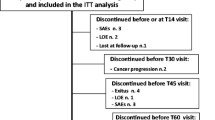Abstract
We evaluated the safety and efficacy of controlled-release morphine sulphate suppositories administered 12-hourly and once daily in patients with chronic cancer in a randomized double-blind crossover trial. Pain was assessed using a 100-mm VAS pain scale and a five-point ordinal pain scale. The VAS pain intensity score was 17.5±17.2 after suppositories every 12 h, versus 16.2±13.4 after suppositories every 24 h (difference not significant). The difference between the mean VAS pain scores with 12-hourly and once-daily dosing was 1.3 mm (not significant). The mean ordinal pain scores were 1.0±0.7 versus 1.0±0.6 for 12-hourly and once-a-day dosing, respectively (not significant). A retrospective power analysis indicated that a difference of 5.9 mm was detectable, even with only 6 patients. Adverse events noted were constipation, nausea, anorexia, and dry mouth. The use of once-a-day controlled-release morphine suppository is a more convenient and equally effective alternative to twice a day dosing.
Similar content being viewed by others
Author information
Authors and Affiliations
Rights and permissions
About this article
Cite this article
Bruera, E., Belzile, M., Neumann, C. et al. Twice-daily versus once-daily morphine sulphate controlled-release suppositories for the treatment of cancer pain . Support Care Cancer 7, 280–283 (1999). https://doi.org/10.1007/s005200050261
Issue Date:
DOI: https://doi.org/10.1007/s005200050261




